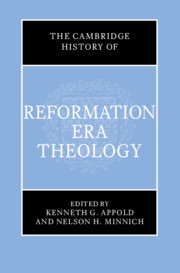Book contents
- The Cambridge History of Reformation-Era Theology
- The Cambridge History of Reformation-Era Theology
- Copyright page
- Contents
- Figures
- Acknowledgments
- Contributors
- Abbreviations
- Introduction
- Part One Theology in an Age of Cultural Transformation
- Part Two Schools and Emerging Cultures of Theology: Diversity and Conformity within Confessions
- Part Three Topics and Disciplines of Theology
- 21 Method and Ethos of Theological Instruction and Discourse
- 22 Biblical Theology
- 23 Systematic Theology
- 24 Controversial Theology
- 25 Sacramental and Liturgical Theology
- 26 Pastoral Theology and Preaching
- 27 Reformation Ethics and Moral Theology
- 28 Ecclesiastical Law in Early Modern Europe
- 29 Spirituality in the Reformation Era (1500–1675)
- 30 Catholic Christianity and Indigenous Religions in the Americas
- 31 Jesuit Catechisms in Japan and India
- 32 Theology in China ca. 1582–ca. 1688
- 33 Theology and Science
- 34 Theology and History
- 35 Theology, Politics, and Warfare
- 36 The Role of Art in the Theological Discourse of the Reformation
- Index
- References
27 - Reformation Ethics and Moral Theology
from Part Three - Topics and Disciplines of Theology
Published online by Cambridge University Press: 27 September 2023
- The Cambridge History of Reformation-Era Theology
- The Cambridge History of Reformation-Era Theology
- Copyright page
- Contents
- Figures
- Acknowledgments
- Contributors
- Abbreviations
- Introduction
- Part One Theology in an Age of Cultural Transformation
- Part Two Schools and Emerging Cultures of Theology: Diversity and Conformity within Confessions
- Part Three Topics and Disciplines of Theology
- 21 Method and Ethos of Theological Instruction and Discourse
- 22 Biblical Theology
- 23 Systematic Theology
- 24 Controversial Theology
- 25 Sacramental and Liturgical Theology
- 26 Pastoral Theology and Preaching
- 27 Reformation Ethics and Moral Theology
- 28 Ecclesiastical Law in Early Modern Europe
- 29 Spirituality in the Reformation Era (1500–1675)
- 30 Catholic Christianity and Indigenous Religions in the Americas
- 31 Jesuit Catechisms in Japan and India
- 32 Theology in China ca. 1582–ca. 1688
- 33 Theology and Science
- 34 Theology and History
- 35 Theology, Politics, and Warfare
- 36 The Role of Art in the Theological Discourse of the Reformation
- Index
- References
Summary
Two overarching and interrelated features of the Reformation period help to bring the variegated landscape of Reformation ethics and moral theology into focus. The first is a common emphasis on a fuller Christianization of the entire population, not simply of clerics and monastics, and hence on the importance of lay religious instruction and formation. Initially pursued in the hope of reform and renewal of the Church Universal, as Reformation divisions hardened the focus turned to competitive confessionalization. The second is a sense of cultural crisis; the drive for reform emerged not primarily out of a sense of optimism and capacity, but rather out of a sense of crisis, as a response to a perceived falling away from the divinely ordained social order. Reformers of various camps parted ways over whether the Christianization of society required doctrinal and institutional reforms or simply better education and formation, and over whether new religious movements represented heightened disorder or a move toward restored order.
- Type
- Chapter
- Information
- The Cambridge History of Reformation Era Theology , pp. 557 - 578Publisher: Cambridge University PressPrint publication year: 2023
References
- 1
- Cited by

